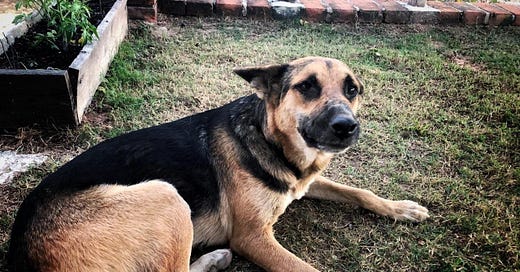[Content warning1]
We came home like we promised. We came home, but we took a few hours in the town below—there was mole to eat and his mom to drive to the bus and nieces to hug and who knows, the hours passed fast enough. Then we said, let’s go back to the cerro in time to catch the sunset. I was ready, past ready, to see the dogs we’d left behind, the ones I promised I’d come back to. One of them had already come down to the pueblo to greet us: Kichom, the old scoundrel, who was looking as fat as a god of scoundrels, with a rheumy eye and the hole in his mouth that the vet couldn’t quite fix the last time we had to stitch him up. Kichom was happy to see me but he played it cool for half an hour. Let me pet him, of course, but didn’t look at me or stop eating his pile of dried tortillas. It was okay, I could take it. Isma told me that only Xochi had wanted anything to do with him those first few days when he’d come back on his own for Día de Muertos. Xochi, of course, was loyal as bone and marrow, and stuck close to him on that trip. He sent me the video of the ofrenda he made on the mountain, with musicians playing at sunset and the plates of food and oranges and glasses of water and Johnny Walker. Xochi and her son Kwi are at their feet, looking hopefully between the feast for the spirits and the camera that would hold their ghosts.
Xochi had been so sad when we left. All of our dogs are smart, but she has the most native intelligence, the ways of observing the world and drawing conclusions that in a different dog would become anxiousness. In her, it was only exuberance, insatiability, eyes that said everything. On the day we left the cerro, our bags in the back of the pickup, she curled onto her seat and would hardly lift her head to say goodbye. I hugged her, thick fur soft against my neck. “Voy a volver,” I told her, over and over. I promise, I’m coming back.
At sunset we came, two white pickups groaning up the incline, and all the dogs came down to bark and jump against the hard metal of the doors like they were soft flesh. All the dogs—all the dogs? Even Mostaza, the one who came up the cerro and refused to leave when she was a racket-ribbed puppy and who took so long to trust us. All the dogs? I jiggled the house key in the lock and pushed the door open. I was smiling at everything, Frijolito sniffing the house she hadn’t seen in five months, the old chipped plates in the dish rack, the slight slope of the kitchen table Isma made out of a tree trunk. The solstice was just days away, the sun setting behind the hill that marks its southmost fall. The line of the ocean reflected that great orange ball even after it had rounded our curve of the earth, like it was holding its breath beneath the water.
Isma was in the round hut with my brother- and sister-in-law. I remembered, at last, that they had told us that Xochi had been feeling a little sick last night. She’d only eaten half of her food. I walked back outside and saw Isma standing uncertainly in the dirt between the porch and the hut.
“She’s dead,” he said.
All the dogs? No, not all. As soon as they’d greeted us, that scratch in the back of my head had told me, “someone’s missing” but I hadn’t thought about Xochi.
I ran past him. She was on her side against the wall. Her tongue hung, gray, from her mouth. Her eyes were still gleaming. Her body was still warm.
“She’s not dead,” I told him. I searched for her pulse but instead found one bloated tick, then another, like gray tumors clinging to her skin.
“Alaya, she’s gone. Maybe hours ago.”
“She’s not dead.” Another tick on her lower lip. Three more behind her ear. I threw them on the floor, where they rowed their legs in the air, wobbling on their inflated backs like a face painted at the very tip of a balloon. How had I forgotten to check in about their tick medicine? Had they been okay when Isma saw them a month and a half ago?
“She was fine last night,” my brother-in-law kept saying. “She was moving and barking and everything. She just didn’t eat as much.”
What he didn’t say: He hadn’t come to feed them that morning because he was heading to the airport five hours away, to pick us up.
What he didn’t say: If we had come in a day earlier, or a day later, maybe he would have been in time to take her to the vet.
If we had just gone to the cerro an hour earlier, maybe we’d have caught her, maybe she would have seen me before she died, maybe those bright, searching eyes that trusted me to keep my promise would have locked on mine as her glassy eyes couldn’t, and she would have heard me as I sobbed over her, burying my fingers in her thick fur, ripping out the ticks, checking again and again for the pulse that wasn’t there—I came back, mi amor, mi querida Xochi, ya volví.
My dog died.





I'm so sorry, Alaya. I know it hurts so much.
I'm so sorry. Such a beautiful good girl. <3